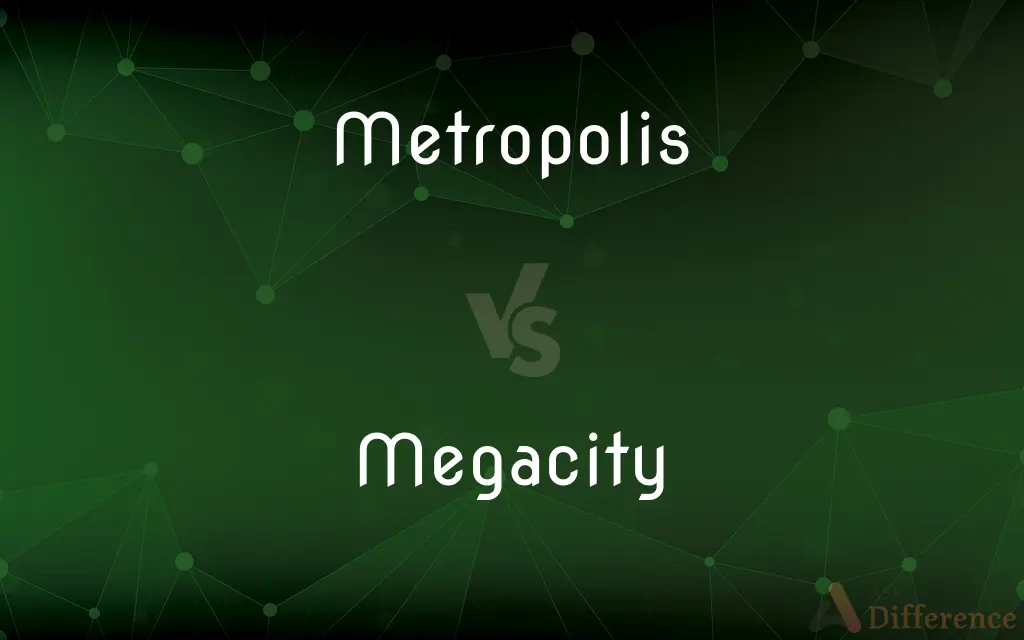Metropolis vs. Megacity — What's the Difference?
By Urooj Arif & Fiza Rafique — Updated on March 18, 2024
A metropolis is a large and significant city, often a central hub for a region, while a megacity is an extremely large city, typically with a population exceeding 10 million people.

Difference Between Metropolis and Megacity
Table of Contents
ADVERTISEMENT
Key Differences
A metropolis is distinguished by its influence and importance in terms of economy, culture, and politics, serving as a central node in its region or country. In contrast, a megacity is defined primarily by its population size, with the emphasis on the challenges and characteristics associated with very large urban populations.
While a metropolis may not always have a vast population, its impact is felt widely through its role as a center for finance, culture, and governance. Megacities, on the other hand, are notable for their size and the significant urban planning, infrastructure, and resource challenges they face.
The term "metropolis" can apply to cities that are the focal points of metropolitan areas, including both the city itself and its surrounding areas with socio-economic ties. Megacities are often metropolises themselves but are specifically categorized by their exceptionally large populations.
Metropolises are key to regional development, often driving innovation, attracting investment, and serving as hubs for transportation and communication. Megacities, while also influential, grapple with issues like congestion, slums, and environmental degradation due to their scale.
The status of a city as a metropolis is more about its strategic importance and less about specific population figures. In contrast, megacities are quantitatively defined, focusing on the unique challenges and dynamics of managing such large urban centers.
ADVERTISEMENT
Comparison Chart
Definition
A large, important city central to a region or country
An extremely large city with a population over 10 million
Key Features
Economic, cultural, political hub
Significant urban planning and infrastructure challenges
Population
Not strictly defined by numbers
Typically exceeds 10 million people
Influence
Regional or national significance
Global impact, often with significant internal challenges
Common Issues
Congestion, housing, economic disparities
Slums, congestion, environmental degradation
Example
New York City as a financial and cultural center
Tokyo, known for its vast size and population density
Compare with Definitions
Metropolis
Faces challenges like housing affordability and transportation.
The metropolis is working to improve its public transit system.
Megacity
Characterized by large-scale urban sprawl and dense populations.
The megacity's population density creates unique infrastructure needs.
Metropolis
Often leads in innovation and development.
The metropolis is home to several world-renowned research institutions.
Megacity
A city with a population exceeding 10 million.
Mumbai is a megacity facing significant urban challenges.
Metropolis
A central city in a metropolitan area, known for its significant influence.
London is a metropolis with a rich cultural history.
Megacity
Defined by its large population.
Its status as a megacity brings both opportunities and challenges.
Metropolis
Acts as a hub for economic, cultural, and political activities.
The metropolis attracted international businesses and tourists.
Megacity
Influential on a global scale but with localized problems.
Despite its issues, the megacity is a key player in the global economy.
Metropolis
Important for its influence, not just population size.
Despite its modest size, the city is considered a metropolis due to its impact.
Megacity
Grapples with slums, environmental issues, and congestion.
The megacity has initiated projects to tackle air pollution.
Metropolis
A metropolis () is a large city or conurbation which is a significant economic, political, and cultural center for a country or region, and an important hub for regional or international connections, commerce, and communications. The term is Ancient Greek (μητρόπολις) and means the "mother city" of a colony (in the ancient sense), that is, the city which sent out settlers.
Megacity
A megacity is a very large city, typically with a population of more than 10 million people. Precise definitions vary: the United Nations Department of Economic and Social Affairs in its 2018 "World Urbanization Prospects" report counted urban agglomerations having over 10 million inhabitants.
Metropolis
A major city, especially the chief city of a country or region
Chicago, the metropolis of the Midwest.
Megacity
A very large city; a megalopolis.
Metropolis
A city or an urban area regarded as the center of a specific activity
A great cultural metropolis.
Metropolis
(Ecclesiastical) The chief see of a metropolitan bishop.
Metropolis
The mother city or country of an overseas colony, especially in ancient Greece.
Metropolis
The mother (founding) polis (city state) of a colony.
Metropolis
A large, busy city, especially as the main city in an area or country or as distinguished from surrounding rural areas.
Capital city
Metropolis
(Orthodox Christianity) The see of a metropolitan bishop, ranking above its suffragan diocesan bishops.
Metropolis
(ecology) A generic focus in the distribution of plants or animals.
Metropolis
The mother city; the chief city of a kingdom, state, or country.
[Edinburgh] gray metropolis of the North.
Metropolis
The seat, or see, of the metropolitan, or highest church dignitary.
The great metropolis and see of Rome.
Metropolis
Any large city.
Metropolis
A large and densely populated urban area; may include several independent administrative districts;
Ancient Troy was a great city
Metropolis
People living in a large densely populated municipality;
The city voted for Republicans in 1994
Common Curiosities
How does a metropolis influence its region?
Through driving economic growth, cultural development, and innovation.
What makes a city a metropolis?
Its significant influence in economic, cultural, and political spheres.
Can a city's status as a metropolis change?
Yes, as its influence grows or declines relative to economic and cultural shifts.
What role do megacities play in the global economy?
They are significant players due to their large populations and economic activities.
How does urban planning differ between metropolises and megacities?
Megacities face more complex challenges due to their size, requiring more sophisticated planning.
What impact do metropolises have on neighboring areas?
They often lead to suburban expansion and influence regional development.
How do governments manage the growth of megacities?
Through policies on housing, urban development, and infrastructure investment.
How is a megacity different from a large city?
Its population exceeds 10 million, bringing unique challenges.
What are common challenges in megacities?
Issues like slums, congestion, and environmental degradation.
How do metropolises and megacities address transportation challenges?
Through developing extensive public transportation networks and infrastructure improvements.
Can a megacity be a metropolis?
Yes, many megacities are also considered metropolises due to their influence.
Why are megacities growing so rapidly?
Factors include urbanization, migration, and economic opportunities.
What makes a metropolis culturally significant?
Its role as a center for arts, entertainment, and cultural heritage.
Are all metropolises megacities?
Not necessarily; a metropolis's status is more about influence than population size.
What measures are megacities taking to combat environmental issues?
Initiatives include green urban planning, pollution control, and sustainable development projects.
Share Your Discovery

Previous Comparison
Caramel vs. Toffee
Next Comparison
Accolade vs. AwardAuthor Spotlight
Written by
Urooj ArifUrooj is a skilled content writer at Ask Difference, known for her exceptional ability to simplify complex topics into engaging and informative content. With a passion for research and a flair for clear, concise writing, she consistently delivers articles that resonate with our diverse audience.
Co-written by
Fiza RafiqueFiza Rafique is a skilled content writer at AskDifference.com, where she meticulously refines and enhances written pieces. Drawing from her vast editorial expertise, Fiza ensures clarity, accuracy, and precision in every article. Passionate about language, she continually seeks to elevate the quality of content for readers worldwide.














































